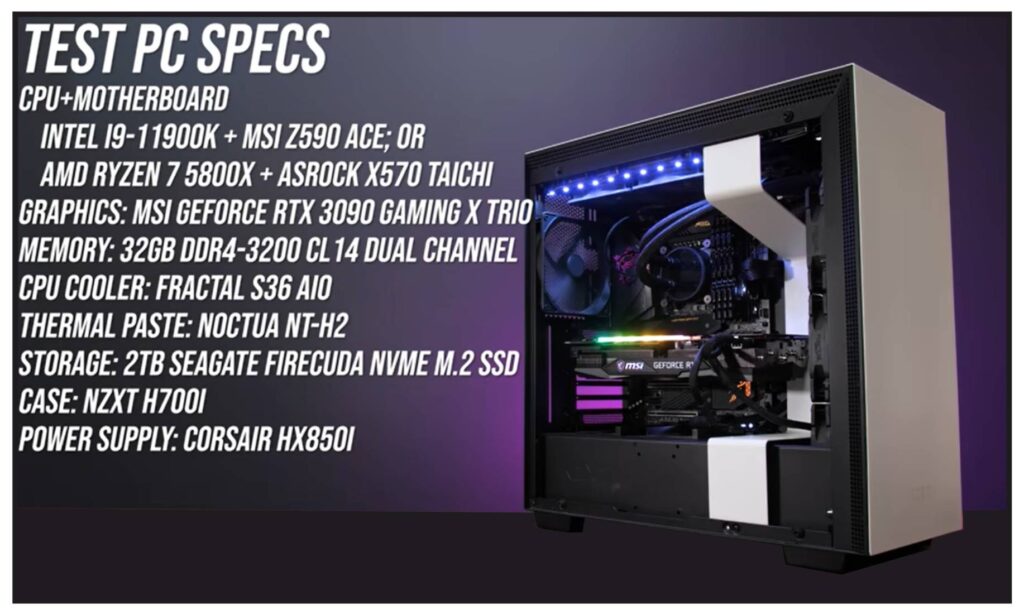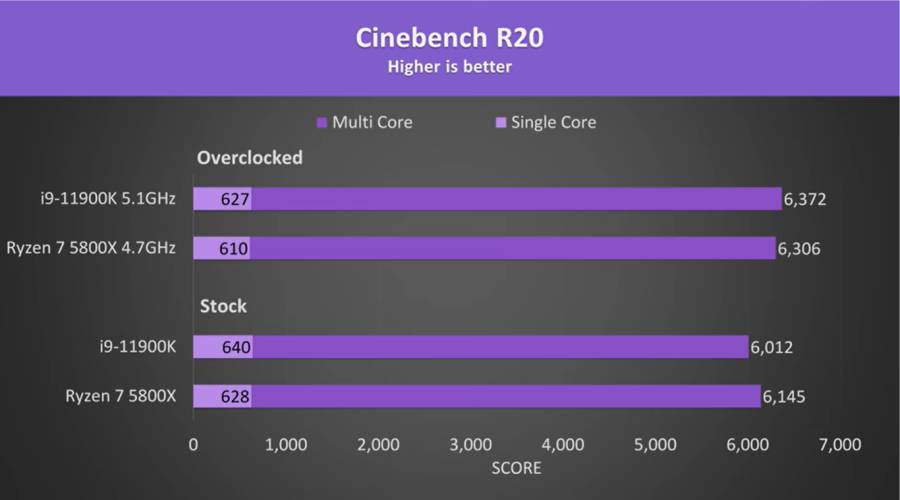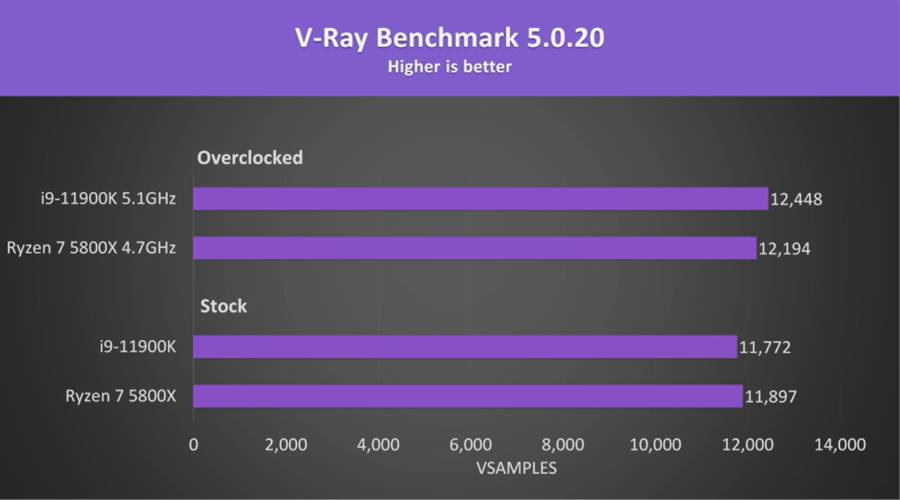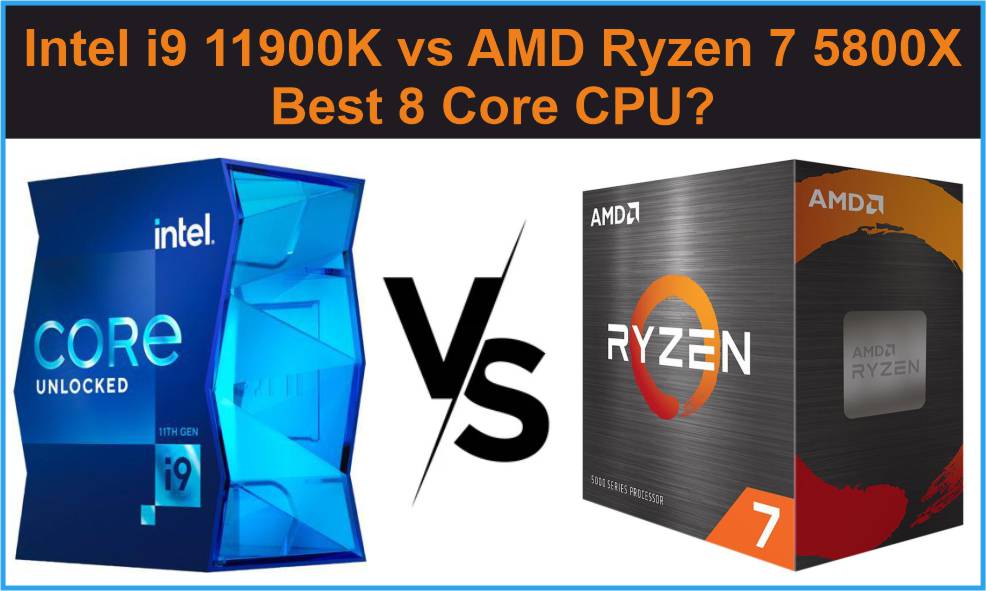Intel i9 11900K vs AMD Ryzen 7 5800X: Intel has a new 8 core CPU, the i9-11900K, but how does it compare against AMD’s 8 core Ryzen 7 5800X? I’ve tested both processors in games and applications to show you the differences and help you decide which is worth it. Both are 8 core 16 thread parts. The Ryzen chip has double the cache, however, the Intel chip is able to reach higher clock speeds. AMD’s 5800X is also cheaper though, but you can refer to current prices with the links below in the description. The 11700K is closer in price to the 5800X, but I don’t have one and want to see if paying extra for the 11900K gets you any extra over Ryzen. Both processors were tested in the same system.

However, I’ve had to change the motherboard between Intel and AMD, otherwise, all other components are the same as listed here. Neither of these CPUs comes with a cooler in the box, so I’ve done all testing with my Fractal S36 AIO with Noctua NT-H2 thermal paste for comparable results. I’ve tested both CPUs at stock without power limits, no MCE or Precision boost to overdrive, and with the following manual, all core overclocks applied. These are by no means finely tuned overclocks, results will of course vary based on silicon lottery. I’ll start out by comparing both processors in applications followed by things like temperatures and power draw afterwards, then we’ll look at gaming and cost per frame value after that to get a better-rounded idea of which is better.

Starting out with Cinebench R23 I’ve got the stock results down the bottom and overclocked results above. There’s really not much difference at all here, whether we’re looking at the single-core or multi-core scores, but let’s break this down. At stock the 5800X was 1% ahead of the 11900Kin multicore, meanwhile, the 11900K was almost 2% faster than the 5800X in single-core, so yeah quite negligible. With both overclocked though the i9 is able to pull off a slight win in multicore, scoring 2% higher than the Ryzen 7 5800X.

I’ve also tested the older Cinebench R20 as a lot of people still use it so you can compare my results, and a similar deal here too. The single-core scores lower with the overclocking place because these are all core overclocks which prevent higher single-core boosting which is possible at stock. I’ve tested Blender with the BMW and Classroombenchmarks. This is a heavily threaded test, the Intel CPU was faster in the shorter BMW test, while the Ryzen CPU was a little faster in the longer classroom test. Either way, again it’s not a big difference between them.

The V-Ray benchmark is another core heavy rendering workload. The results here mirror what we saw earlier in Cinebench, the 5800X was slightly ahead with both at stock, however with both overclocked the i9 was able to push a little higher and take the lead.
The Corona benchmark also uses the processor to render out a scene, and again a similar deal here. The 5800X was a couple of seconds faster at stock, but then the overclock only sped up the 5800X by a second while the i9 lowered its completion time by 5 seconds with the overclock, again putting it in the lead. This is the third time I’ve used this Linux kernel compilation test, and as I’ve seen in other recent processor comparisons I’ve made, Intel seems to have an edge in this multicore test.
Intel i9 11900K vs AMD Ryzen 7 5800X: The 11900K was completing the task almost5% faster at stock, and over 9% faster with both overclocked. Handbrake was used to convert one of my 4Klaptop review videos to 1080p. I feel like I’m repeating myself, but again like most other applications tested the 5800X was a little faster at stock, but then with both overclocked the i9 is able to take the lead. Adobe Premiere was tested with the Puget Systemsbenchmark tool, and this tests things like video exporting, live playback and more. Same deal here too, 5800X ahead at stock, but then i9 pulls off the win when both are overclocked.
Adobe Photoshop was also tested with the PugetSystems benchmark tool. Now the same pattern was happening here too, however, the overclocked score with the 5800X actually lowered a little compared to stock. This test seems to do better with a single-threaded performance from what I’ve seen, so I’m thinking this is the same deal as what I covered earlier when discussing the Cinebench single-core scores, granted based on that you expect the i9 to lower too and it didn’t.
I’ve used 7-Zip to test compression and decompression speeds, and this is an area where AMD has traditionally beat Intel, and that’s not changing here. These are some of the biggest gains in favour of the 5800X out of all applications tested in this comparison. AES encryption and decryption speed didn’t really change with the overclocks, however, this test saw the biggest gains with Intelout of all applications tested, coming in almost 14% ahead of AMD.
Microsoft Excel on the other hand was the biggest win for the Ryzen processor. This test seems to favour a higher cache, which is probably why the 5800X has such a higher lead, it’s got twice as much L3 cache compared to the i9. Like other tests, the i9 was back to scoring better in single-core with Geekbench, though at the stock the 5800X was ahead in the multi-core score.
Same deal as most previous tests though, 11900Ktaking the win for multicore with the overclocks. Here’s how Intel’s new 11th gen 11900Kcompares against AMD’s Ryzen 7 5800X processor with both running at stock speeds. The results could vary a fair bit depending on the specific workload, compression, decompression and Microsoft Excel seem to heavily favour AMD, while Intel has a good lead in the AES tests.
Otherwise, most other applications didn’t see too much difference one way or the other, though Ryzen was ahead in most cases. Here’s how the results change with both manually overclocked on all cores. Most of the applications that were only slightly better with AMD are now instead slightly better with Intel, though we’re still only talking about single-digit performance differences, nothing too major for the most part. The reason for this change becomes evident when looking at the clock speeds.
Intel i9 11900K vs AMD Ryzen 7 5800X: During the Blender Classroom benchmark, a heavily multithreaded test, we can see with both processors at the stock the 11900K was 180MHzhigher than the 5800X. With both overclocked though, it’s now 400MHzhigher than the 5800X, and this additional overclocking headroom is why Intel is able to take the lead in many overclocked tests. Here’s how the total system power draw from the wall looks with the same blender classroom benchmark running, and it’s pretty rough for Intel.
The system with the 11900K is drawing 39%more power all while completing this task slower than the 5800X. With both overclocked, the 11900K is now at least completing the task 3% faster, but with 67% more power, I’ve got to ask, at what cost? Now you might have noticed that the total system power draw with the overclocked 5800X actually lowered by 4 watts compared to running it at stock, and this was simply due to the voltage that my ASRock X570 Taichi motherboards were applying by default with the latest BIOS.
Basically my manual overclock was giving it less power while letting it perform better. More power generally equals more heat, however, at stock, the 5800X was actually running warmer, of course assuming that the sensors reporting to hardware info are somewhat comparable between the two. The 5800X actually gets cooler with my overclock for the same reason it’s using less power just discussed. Let’s get into the gaming tests next, I’vetested 8 games at 1080p, 1440p and 4K resolutions on both processors.
Cyberpunk 2077 was tested in little china with the street kid life path. I’ve got 1080p down the bottom, 1440p in the middle and 4K up top. Generally, there’s going to be a much smaller difference at higher resolutions as the CPU matters less there, I’m just covering them to help illustrate this. The biggest difference was at 1080p, where the 11900K was reaching 3% higher average FPS over the 5800X, so hardly a big gain, however, there was a larger 12% boost seen in the 1% low.
Red Dead Redemption 2 was tested with the games benchmark tool. There’s basically no difference at 1080p, just a 1 FPS lead to the 5800X, the margin of error stuff realistically even when averaging multiple test runs. The i9 was otherwise ahead at 1440p and 4K, but again just small differences, likely not differences you’ll notice in practice in any case. Assassin’s Creed Valhalla was also tested with the game’s benchmark, again only extremely minor differences for either CPU for both1% lows and average FPS, so let’s move along.
Watch Dogs Legion was also tested with the game’s benchmark, and the gaps are a little bigger here, but again not really something you’d notice. When it comes down to it though, just a couple of FPS gains the best case for the 11900K. Control was tested running through the same part of the game on both systems multiple times. This game is quite GPU heavy even at 1080p, so seeing basically no differences to average FPS was kind of expected and I think it illustrates what to expect in games where this is the case.
CS: GO is an esports title where differences in frame rate might actually matter more, which is why I decided to test this older game. The 5800X had the largest gain out of all8 titles tested, but given both are smashing beyond 600 FPS at 1080p it’s hard to say how beneficial that really is. Shadow of the Tomb Raider was tested with the game’s benchmark. As a last-gen game, this modern hardware is able to get us 100 FPS at 4K even with the highest setting preset.
Otherwise not much difference, the i9 is a couple of FPS ahead at 1440p while the Ryzen 7 was 5 FPS ahead at 1080p. Battlefield V was tested in campaign mode. Once more no major differences to the average frame rate at either resolution, however, the i9 had bigger gains in terms of 1% low, particularly at 1080p where it was 12% ahead. When comparing all 8 games tested at 1080p, the 11900K was less than a per cent lower than the 5800X. Of course CS: GO essentially acts as an outlier here compared to the rest of the results.
so should you wish to not count that then the i9 is instead less than a per cent faster, either way, tiny differences in either direction however you slice it. Stepping up to 1440p and things hardly change. Only a couple of games were ahead on Ryzennow, however, given the best case Intel gain is 2%, it’s not exactly an impressive lead, especially when factoring in price difference. At 4K there’s even less difference when taking the averages from all games, which is expected as the processor typically matters less at higher resolutions as most of the load is on the GPU.
When we factor in price, at the moment the11900K is sold on Newegg for $614 USD. For some reason, the KF version without integrated graphics is significantly cheaper at $540, but you can check the links in the description for up to date pricing for either CPU. The 5800X is currently sold for $449 on Newegg right now, and yes it’s actually in stock, at least at the time of recording this anyway.
This hasn’t been the case until recently though, so hopefully, AMD has the supply issues sorted out. Anyway right now today the 5800X is offering better value for gaming, it’s significantly cheaper while offering similar performance in most cases. Honestly, it’s not too surprising to find that the 11900K offers poor value in gaming. I recently compared to Intel’s own i9-10900Kfrom the last generation in this video over here, and basically, the summary is that that older model is generally better than the 11900K in most cases.
Compared to the 5800X, well I think Ryzenis the easy choice right now. In productivity workloads the difference between these two processors was small. Generally, the 5800X was ahead at stock, but then when overclocked the 11900K took the lead in most tests, and that’s simply because the i9 has better overclocking headroom, but again that sort of thing will vary based on the silicon lottery. At the end of the day, I just don’t think the gains from the i9 even when overclocked are that big relative to the higher cost and additional power that it needs.
Both platforms are essentially dead, at least in terms of new CPUs launching on them, so buying today, I think AM4 would give you more room to upgrade as you could go to a 16 core 5950X someday when it’s cheaper. Meanwhile on the Intel side, well, the 11900K is already the top of the 11th gen stack, though you could of course also go for the 10 core 10900K from the last generation. I consider the 5800X better than the i9, and this is already cheaper. I suppose it could still be interesting to see how much more performance is on offer from the 5900X.
Read More:
TOP 3 BEST LENOVO LEGION GAMING LAPTOP | LEGION 5 PRO
THE 3 BEST GAMING HEADSETS FOR PS5 (2021)
BEST MICROPHONE FOR GAMING & STREAMING IN 2021
BUDGET WIRELESS CONTROLLER FOR PS4 AND PC
So this concludes the topic for Intel i9 11900K vs AMD Ryzen 7 5800X | Best 8 Core CPU?. That’s about it for me, I forgot to tell you something, If you’re enjoying this article, please make sure to share the article. If you have any questions, comment down below, and I’ll try my best to answer them.

